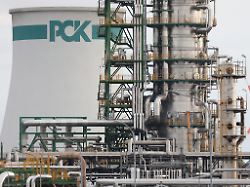Diesel embargo increases pressure
Schwedt supply is not the only problem
1/31/2023 5:13 p.m
As planned, Germany stopped all crude oil imports from Russia at the turn of the year. The refinery in Schwedt is only half utilized. While Poland and Germany are outdoing each other with proposed solutions, the next problem is already looming behind the diesel embargo that will come into effect in February.
The problem finally seemed to be solved in early December: after months of negotiations, Germany and Poland signed an agreement under which the countries would support each other’s oil supplies – just in time before the embargo on Russian supplies came into effect at the beginning of the year. Because supplying the Schwedt refinery on the Polish border via the port of Rostock alone would only be able to use half of the refinery’s capacity – not enough to be able to supply eastern Germany, including Berlin, with petrol or diesel in the long term.
But almost two months later, that is exactly the case: Schwedt is only running at around 55 percent. There are no known permanent contracts for the use of the Polish port of Gdansk. And the region is now looking forward to Sunday with concern: Then the EU embargo will also apply to Russian refined products such as diesel and will increase the pressure even more.
The struggle between Germany and Poland has been dragging on for months as tough as crude oil. The desires, problems and goals of both countries are intertwined like the network of pipes in the refinery on the Polish border. Again and again there are signals, such as a single tanker with crude oil in Gdansk or deliveries from Kazakhstan, that indicate a solution. But a reliable supply for Schwedt has not yet been found.
Poland is reluctant to make firm commitments to the port of Gdansk
For decades, Schwedt was supplied with Russian oil via the Druzhba pipeline. Around twelve million tons are processed there every year, so that Berlin Airport, for example, has enough kerosene. Even parts of western Poland belong to the supply area. The Russian state-owned company Rosneft holds 54 percent of the shares, which, however, have been under German trusteeship since last year. Shell with around 37 percent and the Italian Eni with eight percent hold the rest.
Poland sees the German needs in terms of supply: via Rostock and with the help of so-called flow improvers, a capacity utilization of just under 60 percent is possible at most. However, Schwedt would have to work with at least 70 percent capacity – better more, as the German side admits. Fuel prices are already mostly higher in the East than in the West. Higher utilization could be achieved if tankers were unloaded in Gdańsk and used the Polish-owned Druzhba pipeline network.
But Poland sees a problem and also has a requirement. The problem: Despite trusteeship, Rosneft still owns the majority in Schwedt. Supplying the Russians is hardly conceivable for Poland. The demand: The Polish oil company Orlen, in which the state is the largest shareholder, wants to join Schwedt. Both could actually be solved: Rosneft could be expropriated, which the German Energy Security Act allows in principle. And Shell wants to sell its refining stake anyway, which could further open the door for Orlen.
However, Germany also has plans with Schwedt: in the medium term, the refinery is to become climate-friendly with billions in aid. Hydrogen is to be produced at the site by 2025. German companies such as Enertrag and Verbio have also expressed an interest in getting involved. A Polish group could cause problems there. Especially since the 1,200 employees see the poker game for their refinery with suspicion.
Oil quantities from Kazakhstan, which are now to flow to Germany, at least in smaller quantities, could play into the German cards. However, these must use the Druzhba pipeline, which runs more than 2,000 kilometers across Russian and Belarusian territory. As with gas, the question of a secure supply arises. Also: Russia would collect fees for the transit volumes. That would be contrary to the meaning of the embargo.
Russia covered around twelve percent of diesel requirements
The big solution is now urgent due to the EU diesel embargo from February 5: According to the Fuels and Energy trade association (en2x), Germany has obtained most of its diesel imports from Russia in recent years, in 2022 it was a good twelve percent of total consumption. Poland faces a similar problem. It’s probably not even the quantities that are worrying. Chancellor Olaf Scholz had received assurances for three million tons of diesel during his visit to Abu Dhabi in September. This would at least cover a large part of the missing amount of diesel.
Transport is likely to be more difficult, especially to and in East Germany. The government is extending the priority regulation for energy transport by rail. But the railways in Germany are running at the capacity limit, the rail network is extended and tank wagons are in short supply. The en2x association does not expect a supply gap, but that has its price, says association spokesman Alexander von Gersdorff. “The lower production in the east is compensated for by additional product transport, which represents an additional expense.” At the end of January, the price of petrol at gas stations in eastern Germany was around 2.5 cents and the price of diesel around 1 cent per liter higher than the national average.
